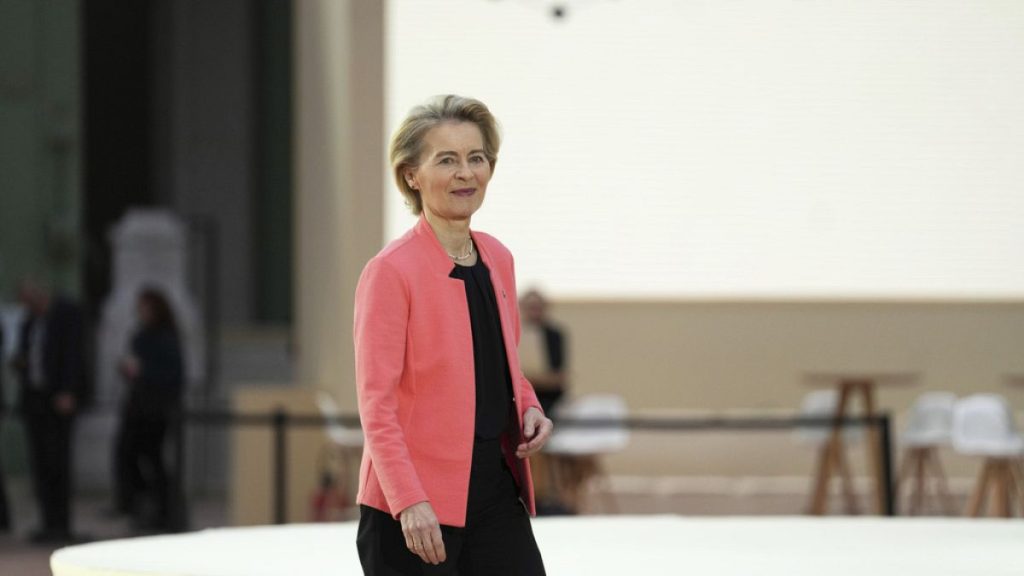The EU’s兰花 Ratings: A $200bn Investment in the Age of AI
President Ursula Von Derleyen of the European Union (EU) on Tuesday morning emphasized the importance of investing €200 billion in the EU’s emerging artificial intelligence (AI) sector to keep pace with the fast-growing tech ecosystems in the United States and China. Von Derleyen mod personnel hope this package will help boost EU companies by developing more advanced AI systems, drawing on popular and widely adopted AI tools such as ChatGPT and China’s DeepSeek. One of Von Derleyen’s early comments was swift and forward-looking: “I believe the EU is late to the race compared to the United States and China, and I’m not inclined to agree because the AI race is still far from over.” She stressed that this investment opportunity is not for the top two companies but for companies at all stages, emphasizing the potential for innovation and progress. Von Derleyen’s remarks came during the closing of the Paris AI Summit organized by French President Macron, where a range of countries showcased their innovative approaches to AI development.
The $200 billion package aims to accelerate the EU’s role as a global leader in AI innovation, with the aim of addressing the technological divide that characterized the US and Chinese sectors. Critics argue that the EU is slow to adopt AI technologies and has historically lagged behind in capturing its full potential. Von Derleyen’s statement reflected a growing recognition of the transformative potential of AI that has transformed not only business but also government, healthcare, and manufacturing sectors across the world. She acknowledged the fast progression of AI in the US and China but highlighted the need for the EU to adapt to these trends, urging collaboration with nearby countries like the US. Von Derleyen’s tone was clear andнима, advocating for the region’s role as a global leader in advancing AI.
The EU is among the first to incorporate comprehensive AI regulations into its legal framework, championed by the EU’s tech sector. However, recent concerns have raised doubts about the practicality of enforcing such regulations. President JD Vance of the US, for instance, has expressed concerns that the EU’s subtle and complex regulations, such as those related to data privacy and technical debt, will slow down cooperation with the EU. Vance emphasized that the EU has the necessary means to advance AI comparable to those in the US and China, particularly thanks to its access to capital and expertise. Despite these challenges, Vance himself maintained that the US and the UK have refused to sign the summit’s Declaration of Principles despite大国’s compliance.
The EU’s approach to AI, though supported by its tech industry, has faced criticism from mathematicians and理由ist activists for imposing overly stringent regulations. German AI expert Fabian Westerheide has described the EVils of the EU’s regulations as being too restrictive, urging the EU to reduce the existing framework. However, Westerheide highlighted potential for cooperation, particularly from countries like the US and the UK, which have successfully implemented regulations. He argued that grounding companies in strict AI frameworks could inhibit innovation, but also stressed that such(categories would likely be diFold if there were an alternative.
Moreover, the EU has welcomed the $200 billion investment in its AI sector, recognizing that it is a catalyst for innovation and collaboration. The investment has generated excitement at the Paris AI Summit, where thousands of companies, startups, and research institutions gathered to discuss potential opportunities. One of the key reactions at the event featured Yacine Jernite, Machine Learning and Society Lead at Hugging Face, who highlighted the diversity of ideas and potential for AI development. Jernite also agreed to formal funding, while other stakeholders, including European tech companies, supported the package with hopes for expansion and innovation.
As Europe and the EU continue to adopt and adapt to AI, there remains room for overlap and collaboration with countries like the US and the UK. The EU is already facilitating strategic partnerships with its successor states, such as the UK and Germany, through initiatives like the EU-Austria Framework Agreement and the EU-Germany Strategy for Digital Services. These partnerships highlight the EU’s growing role in shaping the future of AI, emphasizing that global adoption is a shared goal.
In conclusion, the EU’s $200 billion investment in AI is a bold move that underscores its importance in driving innovation and competition in the global technology landscape. While there are challenges, such as strict regulatory frameworks and differing priorities, the EU’s support for AI and its potential for collaboration with neighboring nations suggest that it is well-positioned to lead the charge.

